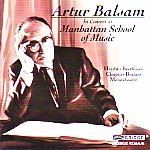The performances collected on these two discs were recorded live at Manhattan School of Music in 1982, 1986, and 1987, and represent the latter part of Artur Balsam’s long career. Despite occasional bobbles, the veteran pianist’s technique is in fine repair, while his musical insights and powers of projection operate at full capacity. Furthermore, the archival recordings capture the full spectrum of Balsam’s singing tone, helped by the excellent acoustics of the Manhattan School’s Borden Auditorium.
It takes time for Balsam to warm up in the Haydn sonata’s Allegro, yet his intense, gorgeously sung-out Adagio is worth the price of admission. Even without the repeats, Balsam judges the finale’s quirky phrase lengths and unpredictable silences to seasoned perfection. Disc 1’s remainder is given over to Beethoven’s Diabelli Variations, recorded at what proved to be Balsam’s final Manhattan School faculty recital. The pianist vividly brings out the music’s wide dynamic and emotional contrasts, while at the same time effecting tremendous cumulative power in terms of tempo relationships and transitions. And listen to his 81-year-old fingers take supple, effortless wing in the Variation 10 Presto, Variation 23’s “banging and scampering”, and in the clear, resilient Fuga (No. 32). As David Starobin’s booklet notes point out, Balsam omitted Variation 27–a memory lapse, I presume, and a very forgivable one in light of the pianist’s remarkable achievement.
Among Balsam’s expansive, flexible, and richly textured Brahms selections, I’m struck by his subtle changes of color and voicing upon restating the A major Intermezzo’s main theme. Balsam’s judiciously proportioned, genuinely felt rubato in the Mendelssohn Song Without Words digs deeper beneath the music’s pretty surface than we hear from most interpreters.
Lastly, the Chopin selections from a 1982 concert provide rare examples of this Warsaw-born pianist playing music by his countryman. The Mazurkas, F-sharp minor Nocturne, and E-flat minor Polonaise receive refreshingly direct, full-bodied, and superbly articulated readings. Balsam’s audience clearly enjoyed his idiomatic, well-pointed rendition of the flashy Variations Brilliantes, although it falls short of Arthur Loesser’s lightness, sparkle, and characterful humor preserved in a live concert tape issued by Marston. As always, every aspect of Bridge’s production proudly reflects the label’s fervent and well-justified commitment to Artur Balsam’s artistic legacy.
































